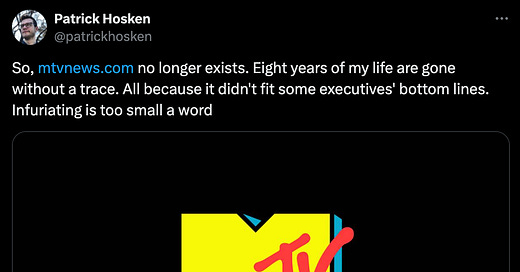Paramount’s extreme cost-cutting measures have erased the existence of nearly 30 years of music journalism, live footage, history, and culture. All of MTV’s news archives are gone, deleted from existence. It got the full Thanos finger snap treatment. MTV itself has morphed into a punchline over the last decade and a half, but for people of my generation, MTV was a premier source of music news and information because they had unprecedented levels of access. All those interviews, concert footage, and reportage are gone, and this scares the shit out of me. This information could and should have been handed to the Library of Congress, but the mindless fuck chimps at Paramount decided to hit the delete button instead.
Paramount, like many streaming companies, has been desperately seeking a merger partner after its strategy of producing increasingly worse content at higher prices finally stopped lining their pockets. With streaming growth stalling, these companies have adopted the exploitative tactics of traditional cable, nickel-and-diming users and pursuing pointless, massive mergers.
These corporate overlords assume that entities like the Internet Archive will swoop in to preserve our collective history despite their blatant neglect. But that's a fallacy; archivists are struggling with their own existential crises in an era dominated by unchecked corporate power, a corrupt and dysfunctional Congress, and a horde of narcissistic, multi-billionaire man-children.
The streaming model has disgracefully obliterated countless movies and TV shows, with studios shamelessly taking fully-completed projects and shelving them indefinitely. Warner Bros-owned Max stands out as the most egregious offender in this appalling trend, ruthlessly holding films like Batgirl and Coyote Vs. Acme hostage with no intention of ever releasing them, despite being fully completed and ready to air. Now, Comedy Central has decided to jump on this despicable bandwagon, depriving fans of some of its most popular and beloved shows. This blatant disregard for both creators and audiences underscores the utter contempt that these billion-dollar corporations have for the art and culture they so cynically exploit.
Paramount owns CMT and Comedy Central. The sister-humping greedheads in their boardroom shuttered the websites to both, so unless you’ve got a friend who recorded Jon Stewart and Stephen Colbert going deep back-to-back like a comedy Ruth and Gerhig, you’re fucked. Those clips are not available to the public, which is ostensibly who they were made for. This also means no one will see the start of Colbert’s career, or Steve Carell’s, or John Oliver’s… Larry Wilmore, Olivia Munn, Ed Helms, Rob Corddry, Wyatt Cenac, Michael Che, Samantha Bee, Hasan Minhaj, Roy Wood Jr., all shuttered up in the archives with no foreseeable way to access them.
Deleting or disabling access to these archives erases a crucial part of cultural and media history. Future generations lose access to primary sources that document how music, culture, and societal attitudes evolved over decades. The deletion reflects a blatant disregard for the historical and educational value of these records and it’s a decision driven by corporate greed on the part of assbags who lack the creativity, drive, or ability to create anything of substance.
History needs stewards, not owners. Whoever legally owns the archive does not legally own the history, even if they own the creative work of thousands of writers, editors, producers and more. This archive — of MTV News, where you heard it first — needs to be available to the public.
-Michael Alex, founding editor of MTV News website
Scholars, historians, and educators rely on such archives for research and teaching. The loss of MTV News archives deprives them of crucial material that could contribute to a deeper understanding of recent history. MTV News often highlighted voices and issues mainstream media regularly ignored. Erasing these records can be seen as an attempt to silence those voices and diminish their impact. The decision to delete these archives illustrates the shitty vision of corporate strategies focused solely on immediate financial gains, ignoring the long-term value of preserving cultural and historical records.





